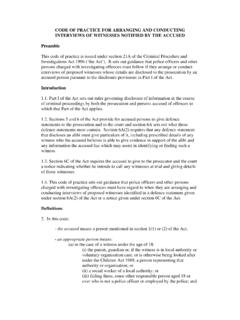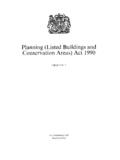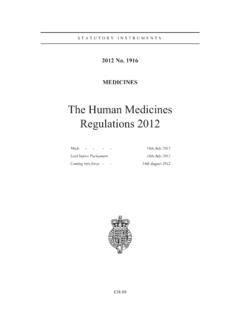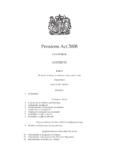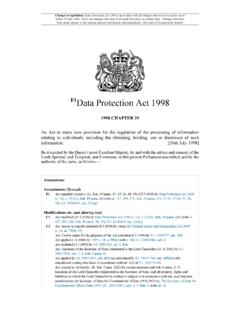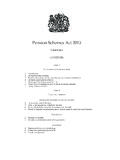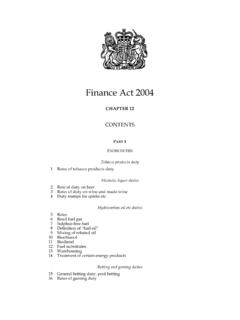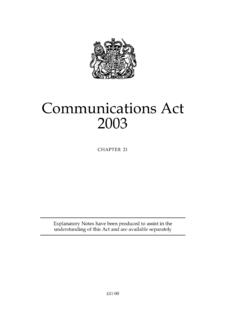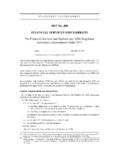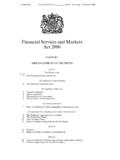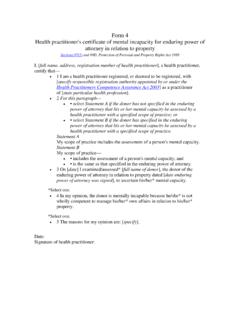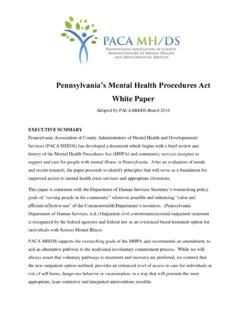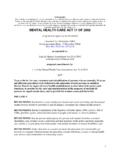Transcription of Mental Capacity Act 2005 - Legislation.gov.uk
1 Mental Capacity Act 2005 CHAPTER 9 CONTENTSPART 1 PERSONS WHO LACK CAPACITYThe principles1 The principlesPreliminary2 People who lack capacity3 Inability to make decisions4 Best interests5 Acts in connection with care or treatment6 Section 5 acts: limitations7 Payment for necessary goods and services8 ExpenditureLasting powers of attorney9 Lasting powers of attorney10 Appointment of donees11 Lasting powers of attorney: restrictions12 Scope of lasting powers of attorney: gifts13 Revocation of lasting powers of attorney of donee and others if no power created or power revokedGeneral powers of the court and appointment of deputies15 Power to make declarations16 Powers to make decisions and appoint deputies: general17 Section 16 powers: personal welfare18 Section 16 powers: property and affairsMental Capacity Act 2005 (c. 9)ii19 Appointment of deputies20 Restrictions on deputies21 Transfer of proceedings relating to people under 18 Powers of the court in relation to lasting powers of attorney22 Powers of court in relation to validity of lasting powers of attorney23 Powers of court in relation to operation of lasting powers of attorneyAdvance decisions to refuse treatment24 Advance decisions to refuse treatment.
2 General25 Validity and applicability of advance decisions26 Effect of advance decisionsExcluded decisions27 Family relationships Health Act matters29 Voting rightsResearch30 Research31 Requirements for approval32 Consulting carers safeguards34 Loss of Capacity during research projectIndependent Mental Capacity advocate service35 Appointment of independent Mental Capacity advocates36 Functions of independent Mental Capacity advocates37 Provision of serious medical treatment by NHS body38 Provision of accommodation by NHS body39 Provision of accommodation by local authority40 Exceptions41 Power to adjust role of independent Mental Capacity advocateMiscellaneous and supplementary42 Codes of practice43 Codes of practice: procedure44 Ill-treatment or neglectPART 2 THE COURT OF PROTECTION AND THE PUBLIC GUARDIANThe Court of Protection45 The Court of Protection46 The judges of the Court of ProtectionMental Capacity Act 2005 (c.)
3 9)iiiSupplementary powers47 General powers and effect of orders orders and directions49 Power to call for reportsPractice and procedure50 Applications to the Court of Protection51 Court of Protection Rules52 Practice directions53 Rights of appealFees and costs54 Fees55 Costs56 Fees and costs: supplementaryThe Public Guardian57 The Public Guardian58 Functions of the Public Guardian59 Public Guardian Board60 Annual reportCourt of Protection Visitors61 Court of Protection VisitorsPART 3 MISCELLANEOUS AND GENERALD eclaratory provision62 Scope of the ActPrivate international law63 International protection of adultsGeneral64 Interpretation65 Rules, regulations and orders66 Existing receivers and enduring powers of attorney and consequential amendments and repeals68 Commencement and extent69 Short titleMental Capacity Act 2005 (c. 9)ivSchedule 1 Lasting powers of attorney: formalitiesPart 1 Making instrumentsPart 2 RegistrationPart 3 Cancellation of registration and notification of severancePart 4 Records of alterations in registered powersSchedule 2 Property and affairs.
4 Supplementary provisionsSchedule 3 International protection of adultsPart 1 PreliminaryPart 2 Jurisdiction of competent authorityPart 3 Applicable lawPart 4 Recognition and enforcementPart 5 Co-operationPart 6 GeneralSchedule 4 Provisions applying to existing enduring powers of attorney Part 1 Enduring powers of attorneyPart 2 Action on actual or impending incapacity of donorPart 3 Notification prior to registrationPart 4 RegistrationPart 5 Legal position after registrationPart 6 Protection of attorney and third partiesPart 7 Joint and joint and several attorneysPart 8 InterpretationSchedule 5 Transitional provisions and savings Part 1 Repeal of Part 7 of the Mental Health Act 1983 Part 2 Repeal of the Enduring Powers of Attorney Act 1985 Schedule 6 Minor and consequential amendments Schedule 7 Repeals ELIZABETH IIc. 9 Mental Capacity Act 20052005 CHAPTER 9An Act to make new provision relating to persons who lack Capacity ; toestablish a superior court of record called the Court of Protection in place ofthe office of the Supreme Court called by that name; to make provision inconnection with the Convention on the International Protection of Adultssigned at the Hague on 13th January 2000; and for connected purposes.
5 [7th April 2005]E IT ENACTED by the Queen s most Excellent Majesty, by and with the advice andconsent of the Lords Spiritual and Temporal, and Commons, in this presentParliament assembled, and by the authority of the same, as follows: PART 1 PERSONS WHO LACK CAPACITYThe principles1 The principles(1)The following principles apply for the purposes of this Act.(2)A person must be assumed to have Capacity unless it is established that he lackscapacity.(3)A person is not to be treated as unable to make a decision unless all practicablesteps to help him to do so have been taken without success.(4)A person is not to be treated as unable to make a decision merely because hemakes an unwise decision.(5)An act done, or decision made, under this Act for or on behalf of a person wholacks Capacity must be done, or made, in his best Capacity Act 2005 (c. 9)Part 1 Persons who lack capacity2(6)Before the act is done, or the decision is made, regard must be had to whetherthe purpose for which it is needed can be as effectively achieved in a way thatis less restrictive of the person s rights and freedom of who lack Capacity (1)For the purposes of this Act, a person lacks Capacity in relation to a matter if atthe material time he is unable to make a decision for himself in relation to thematter because of an impairment of, or a disturbance in the functioning of, themind or brain.
6 (2)It does not matter whether the impairment or disturbance is permanent ortemporary.(3)A lack of Capacity cannot be established merely by reference to (a)a person s age or appearance, or(b)a condition of his, or an aspect of his behaviour, which might leadothers to make unjustified assumptions about his Capacity .(4)In proceedings under this Act or any other enactment, any question whether aperson lacks Capacity within the meaning of this Act must be decided on thebalance of probabilities.(5)No power which a person ( D ) may exercise under this Act (a)in relation to a person who lacks Capacity , or (b)where D reasonably thinks that a person lacks Capacity , is exercisable in relation to a person under 16.(6)Subsection (5) is subject to section 18(3).3 Inability to make decisions(1)For the purposes of section 2, a person is unable to make a decision for himselfif he is unable (a)to understand the information relevant to the decision,(b)to retain that information,(c)to use or weigh that information as part of the process of making thedecision, or(d)to communicate his decision (whether by talking, using sign languageor any other means).
7 (2)A person is not to be regarded as unable to understand the informationrelevant to a decision if he is able to understand an explanation of it given tohim in a way that is appropriate to his circumstances (using simple language,visual aids or any other means).(3)The fact that a person is able to retain the information relevant to a decision fora short period only does not prevent him from being regarded as able to makethe decision.(4)The information relevant to a decision includes information about thereasonably foreseeable consequences of (a)deciding one way or another, orMental Capacity Act 2005 (c. 9)Part 1 Persons who lack capacity3(b)failing to make the interests(1)In determining for the purposes of this Act what is in a person s best interests,the person making the determination must not make it merely on the basis of (a)the person s age or appearance, or(b)a condition of his, or an aspect of his behaviour, which might leadothers to make unjustified assumptions about what might be in his bestinterests.
8 (2)The person making the determination must consider all the relevantcircumstances and, in particular, take the following steps.(3)He must consider (a)whether it is likely that the person will at some time have Capacity inrelation to the matter in question, and(b)if it appears likely that he will, when that is likely to be.(4)He must, so far as reasonably practicable, permit and encourage the person toparticipate, or to improve his ability to participate, as fully as possible in anyact done for him and any decision affecting him.(5)Where the determination relates to life-sustaining treatment he must not, inconsidering whether the treatment is in the best interests of the personconcerned, be motivated by a desire to bring about his death.(6)He must consider, so far as is reasonably ascertainable (a)the person s past and present wishes and feelings (and, in particular,any relevant written statement made by him when he had Capacity ),(b)the beliefs and values that would be likely to influence his decision if hehad Capacity , and(c)the other factors that he would be likely to consider if he were able todo so.
9 (7)He must take into account, if it is practicable and appropriate to consult them,the views of (a)anyone named by the person as someone to be consulted on the matterin question or on matters of that kind,(b)anyone engaged in caring for the person or interested in his welfare,(c)any donee of a lasting power of attorney granted by the person, and(d)any deputy appointed for the person by the court,as to what would be in the person s best interests and, in particular, as to thematters mentioned in subsection (6).(8)The duties imposed by subsections (1) to (7) also apply in relation to theexercise of any powers which (a)are exercisable under a lasting power of attorney, or(b)are exercisable by a person under this Act where he reasonably believesthat another person lacks Capacity .(9)In the case of an act done, or a decision made, by a person other than the court,there is sufficient compliance with this section if (having complied with therequirements of subsections (1) to (7)) he reasonably believes that what he doesor decides is in the best interests of the person Capacity Act 2005 (c.)
10 9)Part 1 Persons who lack capacity4(10) Life-sustaining treatment means treatment which in the view of a personproviding health care for the person concerned is necessary to sustain life.(11) Relevant circumstances are those (a)of which the person making the determination is aware, and(b)which it would be reasonable to regard as in connection with care or treatment(1)If a person ( D ) does an act in connection with the care or treatment of anotherperson ( P ), the act is one to which this section applies if (a)before doing the act, D takes reasonable steps to establish whether Placks Capacity in relation to the matter in question, and(b)when doing the act, D reasonably believes (i)that P lacks Capacity in relation to the matter, and(ii)that it will be in P s best interests for the act to be done.(2)D does not incur any liability in relation to the act that he would not haveincurred if P (a)had had Capacity to consent in relation to the matter, and(b)had consented to D s doing the act.
